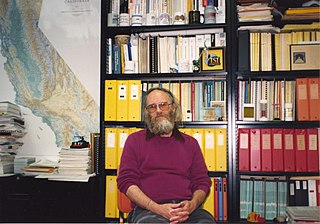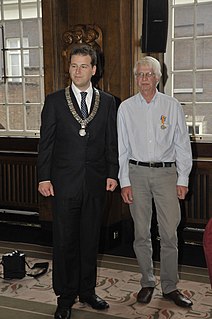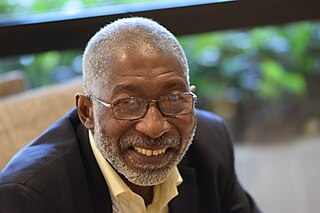
Jonathan Bruce Postel was an American computer scientist who made many significant contributions to the development of the Internet, particularly with respect to standards. He is known principally for being the Editor of the Request for Comment (RFC) document series, for Simple Mail Transfer Protocol (SMTP), and for administering the Internet Assigned Numbers Authority (IANA) until his death. In his lifetime he was known as the "god of the Internet" for his comprehensive influence on the medium.

Stephen D. Crocker is the inventor of the Request for Comments series, authoring the very first RFC and many more. He attended Van Nuys High School, as did Vint Cerf and Jon Postel. Crocker received his bachelor's degree (1968) and PhD (1977) from the University of California, Los Angeles. Crocker was appointed as chair of the board of the Internet Corporation for Assigned Names and Numbers, ICANN in 2011.

The Internet Assigned Numbers Authority (IANA) is a function of ICANN, a nonprofit private American corporation that oversees global IP address allocation, autonomous system number allocation, root zone management in the Domain Name System (DNS), media types, and other Internet Protocol-related symbols and Internet numbers.

China has been on the internet intermittently since May 1989 and on a permanent basis since 20 April 1994. In 2008 China became the country with the largest population on the Internet and has remained so since. As of July 2016, 730,723,960 people were internet users.

Internet2 is a not-for-profit United States computer networking consortium led by members from the research and education communities, industry, and government. The Internet2 consortium administrative headquarters are located in Ann Arbor, Michigan, with offices in Washington, D.C. and Emeryville, California.
The Computer Science Network (CSNET) was a computer network that began operation in 1981 in the United States. Its purpose was to extend networking benefits, for computer science departments at academic and research institutions that could not be directly connected to ARPANET, due to funding or authorization limitations. It played a significant role in spreading awareness of, and access to, national networking and was a major milestone on the path to development of the global Internet. CSNET was funded by the National Science Foundation for an initial three-year period from 1981 to 1984.

Eugene Howard Spafford, commonly known as Spaf, is an American professor of computer science at Purdue University and a leading computer security expert.
The Jonathan B. Postel Service Award is an award named after Jon Postel. The award has been presented every year since 1999 by the Internet Society to "honor a person who has made outstanding contributions in service to the data communications community."
The China Education and Research Network is the first nationwide education and research computer network in China. The CERNET project is funded by the Chinese government and directly managed by the Chinese Ministry of Education. It is constructed and operated by Tsinghua University and the other leading Chinese universities.
Peter Thomas Kirstein is a British computer scientist who played a role in the creation of the Internet; he is "often recognized as the father of the European Internet".
The China Next Generation Internet (CNGI) project is a five-year plan initiated by the Chinese government with the purpose of gaining a significant position in the future development of the Internet through the early adoption of IPv6.

Robert "Rob" Blokzijl was a Dutch physicist and computer scientist at the National Institute for Subatomic Physics (NIKHEF), and an early internet pioneer. He was founding member and chairman of RIPE, the Reseaux IP Europeenne, the European Internet Registrar organisation.

Mahabir Pun is a Nepalese teacher, social entrepreneur and an activist known for his extensive work in applying wireless technologies to develop remote areas of the Himalayas, also known as the Nepal Wireless Networking Project. He is a widely known figure in Nepal, and his work has been recognized by the Ashoka Foundation, the Ramon Magsaysay Foundation, University of Nebraska, and Global Ideas Bank. He is a humanitarian whose work is inspiring many youths to return their own country and serve it for its development. Mahabir Pun is a person with phenomenal qualities, he is always ready to eradicate different problems inside the country.

Who Controls the Internet? Illusions of a Borderless World is a 2006 book by Jack Goldsmith and Tim Wu that offers an assessment of the struggle to control the Internet. Starting with a discussion of the early vision of a borderless global community, the authors present some of the most prominent individuals, ideas and movements that have played key roles in developing the Internet. As law professors at Harvard and Columbia, respectively, Goldsmith and Wu assert the important role of government in maintaining Internet law and order while debunking the claims of techno-utopianism that have been espoused by theorists such as Thomas Friedman.

Nii Narku Quaynor is a scientist and engineer who has played an important role in the introduction and development of the Internet throughout Africa.
Stephen Wolff is one of the many fathers of the Internet. He is mainly credited with turning the Internet from a government project into something that proved to have scholarly and commercial interest for the rest of the world. Dr. Wolff realized before most the potential in the Internet and began selling the idea that the Internet could have a profound effect on both the commercial and academic world.

Elizabeth Jocelyn "Jake" Feinler is an American information scientist. From 1972 until 1989 she was director of the Network Information Systems Center at the Stanford Research Institute. Her group operated the Network Information Center (NIC) for the ARPANET as it evolved into the Defense Data Network (DDN) and the Internet.
Lixia Zhang is the Jonathan B. Postel Professor of Computer Science at the University of California, Los Angeles. Her expertise is in computer networks; she helped found the Internet Engineering Task Force, designed the Resource Reservation Protocol, coined the term "middlebox", and pioneered the development of named data networking.
Kanchana Kanchanasut is a Thai computer science professor at the Asian Institute of Technology who became the first Thai person to use email. She hosted the first server in Thailand connected to the Internet and registered Thailand's country code top-level domain .th in 1988. Kanchanasut was inducted into the Internet Hall of Fame in 2013.











